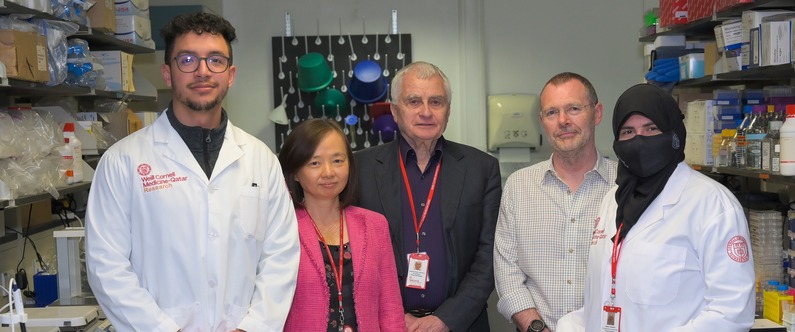WCM-Q and international experts review whether metformin is a drug for all diseases
 From left to right – Medical student Khalifa Bshesh, Dr. Hong Ding, Dr. Chris R. Triggle, Dr. Ross MacDonald, and Dr. Isra Marei
From left to right – Medical student Khalifa Bshesh, Dr. Hong Ding, Dr. Chris R. Triggle, Dr. Ross MacDonald, and Dr. Isra Marei
Researchers from Weill Cornell Medicine-Qatar (WCM-Q) have, together with colleagues from Canada and the U.S., reviewed whether metformin is a drug that can protect against diseases other than type 2 diabetes. The review was published in Metabolism, a leading journal dedicated to human metabolism research.
In the late 1950s, metformin was used to treat type 2 diabetes. Today, the drug continues to be the preferred choice for millions of people living with the condition. A collection of encouraging pre-clinical and clinical findings has sparked interest in re-purposing the drug to treat several other diseases, such as COVID-19.
Titled ‘Metformin: Is it a drug for all reasons and diseases?’ The objectives of the review were to evaluate the putative mechanism(s) of action of metformin, analyze the controversial evidence for metformin’s effectiveness in the treatment of diseases other than type 2 diabetes, assess the reproducibility of the data, and reach an informed conclusion as to whether metformin is a drug for all diseases and reasons.
The review concluded that “the primary clinical benefits of metformin result from its insulin-sensitizing and anti-hyperglycemic effects that secondarily contribute to a reduced risk of a number of diseases and thereby enhancing healthspan.” In addition, there is no evidence to suggest that metformin “exerts significant direct anti-inflammatory effects other than indirectly via its positive effects on glucose metabolism.”
As such, the anti-inflammatory and endothelial-vascular protective effects of the drug are likely to be the primary reason for health improvements witnessed in COVID-19 patients, especially since the most severely affected patients are clinically obese and carry pre-existing diabetes.
The WCM-Q contributing team included Dr. Chris R. Triggle, professor of pharmacology, Dr. Hong Ding, associate professor of research in pharmacology, Dr. Isra Marei, post-doctoral associate in pharmacology, Dr. Ross MacDonald, librarian of scholarly communications, WCM-Q alumnus Dr. Ibrahim Mohammed, and fourth-year medical student Khalifa Bshesh.
International collaborators included Canada-based Kevin Ye, MSc, department of Biomedical Physiology and Kinesiology, Simon Fraser University, and Dr. Morley D. Hollenberg, professor, department of Physiology and Pharmacology, Cumming School of Medicine, University of Calgary, in addition to Dr. Michael A. Hill, interim director at Dalton Cardiovascular Research Center, and professor at the department of Medical Pharmacology and Physiology, School of Medicine, University of Missouri, U.S.
Dr. Triggle said: “Reviewed pre-clinical and clinical data highlights the benefits of metformin in protecting against a series of diseases. It is, however, important to also keep in mind that since metformin is not metabolized and is excreted unchanged, the environmental impact of the drug is an emerging issue that has been linked to endocrine disruption in fish. In addition, but based to date on a single study from Denmark that was published in 2022, the drug’s extensive use in type 2 diabetes has also raised concerns over its effects on human reproduction. More studies are therefore needed to determine the full impact of metformin. That said, interest in metformin is likely to continue to grow in the years to come.”
Drs. Ding and Triggle received support from the Biomedical Research Program (BMRP) at WCM-Q, while Dr. Marei was supported by ECRA Award [ECRA02-007-3-006] from the Qatar National Research Fund (a member of Qatar Foundation) and the L’Oréal-UNESCO for Women in Science Middle East Regional Young Talents Program, 2020.
The findings achieved herein are solely the responsibility of the authors. All authors have declared that there is no conflict of interest.
The full review can be accessed here